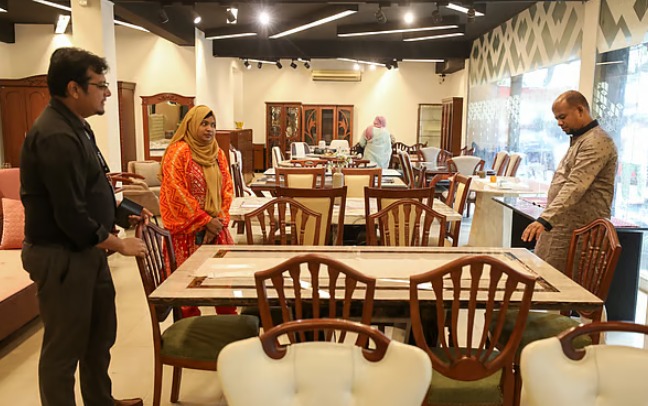Desk Report,
Furniture industry not getting bond benefits despite government decision
The furniture industry has been under discussion for a long time as a potential export sector. To utilize that opportunity, the government took a policy decision to grant bond licenses to the furniture industry to import raw materials duty-free. But the issue of bonds has been on file for a couple of years.
Furniture industry not getting bond benefits despite government decision
Meanwhile, the country’s furniture sector is not keeping up with competing countries due to various reasons including high tariffs on raw material imports and business costs. As a result, furniture exports are stuck in one place. In such a situation, entrepreneurs in the sector are worried about the additional 35 percent countervailing duty imposed by US President Donald Trump. This is because the US is a big market for Bangladeshi furniture. Furniture businessmen say that if the countervailing duty is implemented, furniture exports to the US market will be threatened. To increase furniture exports to the US and other markets, it is necessary to provide bond facilities for raw material imports, even against 100 percent bank guarantees.
According to the Export Promotion Bureau (EPB), furniture worth 45.5 million US dollars was exported in the outgoing fiscal year 2024-25. This export is 37 percent less than the previous year. In the last fiscal year, 43 percent or 19.7 million dollars of furniture exports were destined for the United States.
According to a report by the Bangladesh Investment Development Authority (BIDA) published three years ago, the furniture sector employs the highest number of 2.5 million people after the ready-made garment industry. This sector contributes about 1.2 percent to the country’s GDP. More than 40,000 small and large enterprises in the country are involved in furniture production and marketing.
It is known that in 2021, the Bangladesh Trade and Tariff Commission recommended to the Ministry of Commerce to provide bond facilities to four sectors, including furniture, to import raw materials for partially export-oriented industries against an amount equivalent to a bank guarantee for 100 percent export-oriented industries in order to diversify exports. Then in March 2023, the 11th meeting of the National Committee on Exports chaired by the then Prime Minister took a policy decision to provide bond warehouse facilities to other export-oriented industries like the ready-made garment industry. This issue is included in the Import Policy Order 2021-24, Export Policy 2021-24 and Tariff Policy 2023.
Several businessmen told Prothom Alo that the furniture industry still has to rely on imports for the raw materials it needs. However, the duties on the parts and raw materials required for furniture production are very high. Now, duties ranging from 10 to 127 percent have to be paid at different stages. This is hindering businessmen in making high-quality furniture.
When asked, Salim H Rahman, Chairman and Managing Director (MD) of the country’s leading furniture brand Hatil, said, “Although some raw materials are available in the country, the quantity and quality are not suitable for export. Therefore, wood, boards and various fittings have to be imported. This increases the cost and production time. In such a context, the situation will become complicated if the duties are increased again in the US market. This is a warning for us.’
Selim H Rahman further said that if emphasis is not given to export diversification, an economic crisis may arise. With the right strategy, support and effective policies, the furniture sector can become one of the main export sectors of Bangladesh in the future. Therefore, it is necessary to quickly implement the issue of providing bond facilities to partially export-oriented industries in the light of export policy, import policy order and national customs policy.




